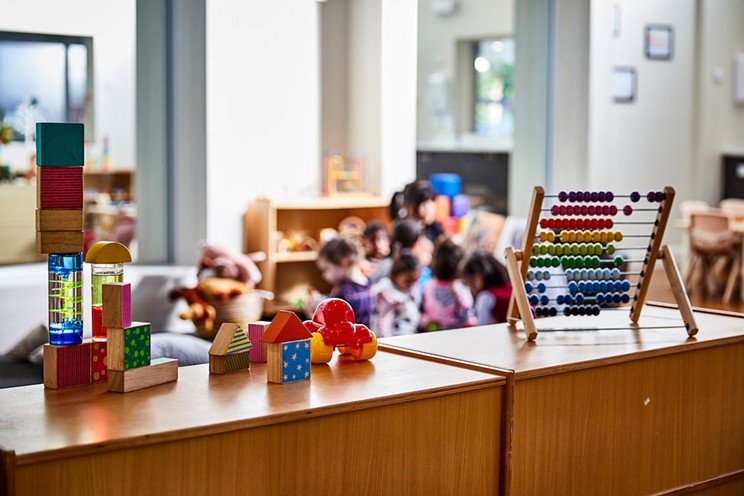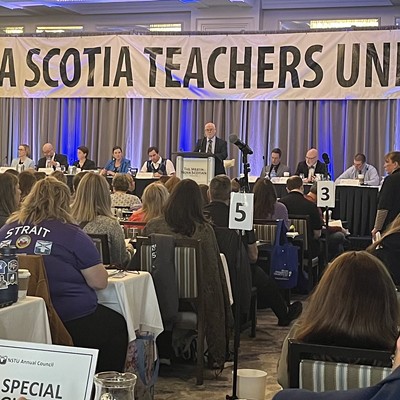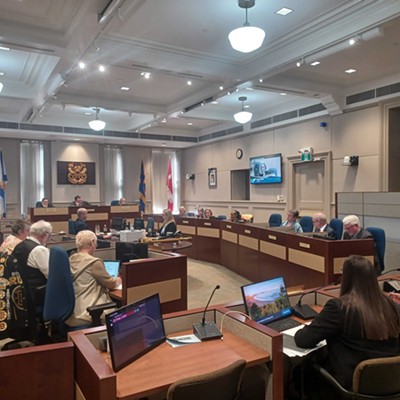Since 2021, families in Nova Scotia have been promised $10-a-day child care, on average, by March 2026. This promise, made through the Canada-Nova Scotia Canada-Wide Early Learning and Child Care Agreement, pledges $605 million from Ottawa plus $40 million from Nova Scotia over five years to make sure all families find “high-quality, affordable, flexible and inclusive early learning and child care no matter where they live,” the agreement says.
But a report published in May 2023 by the Canadian Centre for Policy Alternatives says affordable child care is only possible if there are enough child care spaces. Says the report: “In more populated areas of Nova Scotia, from small towns to its one big city of Halifax, about a third of children live in child care deserts. Finding a child care space is twice as hard in rural areas, where 61 per cent of children live in child care deserts.”
The Canada-Wide agreement is meant to end child care deserts and prioritize the funding of not-for-profit and public child care programs and services to combat costs to parents.
So, two years later, what has the agreement achieved?
In an email to The Coast, Nova Scotia’s Department of Education and Early Childhood Development says as of March 2023, $107.3 million has been spent under the agreement, with $25.9 million on new and renovated child care spaces, $45.7 million on parent fee reductions and $22.2 million on early childhood educator (ECE) compensation.
With approximately $500 million still to be released, how the province will achieve its ambitious goals of $10/day child care, opening of 9,500 new child care spaces and continuing to raise ECE wages by 2026 remains to be seen. Why? Because the province is late.
The public action plan needed to release future funding was due in spring 2023.
In an August 2023 statement, NDP leader Claudia Chender said the provincial government has not met deadlines of the agreement and has stalled $123 million in federal funding for 2023-24 as a result.

In response, Nova Scotia’s minister of education and early childhood development, Becky Druhan, said missing this deadline will have “no impact at all on the availability of funding right now for the work that’s underway,” as she told the Halifax Examiner. “We will not leave any funding on the table this year or throughout the course of the agreement.”
Funding is meant to be released to the province twice per fiscal year—in June and November—depending on certain conditions being met, including the publication of an action plan for 2023-2026.
Another condition is that Nova Scotia “consult with parents, child care providers, experts, Indigenous peoples, official language minority communities and other interested parties as an important step in developing and revising its Action Plan. Nova Scotia will outline the results of consultations in its Action Plan as well as through its annual reporting.”
If the government plans to get back on track before November’s funding deadline, it has to develop and release their action plan now.
Perhaps in light of that, the early childhood education department is asking the public to weigh in during a two-part engagement campaign called “Building a Brighter Future Through Early Learning and Child Care: Your Input Matters.”
On Sept. 18, a short online survey went live for all Nova Scotians to share their thoughts about what matters most regarding early childhood education, with the goal of $10/day child care still very much on the table. Kayleigh Gildart is the project executive with the department.
“Affordability for families is one of the key goals [of the agreement],” says Gildart. “And it's really one of the key goals of building a publicly funded early learning system. It remains a key priority. And by 2026 we will have achieved an average of $10-a-day care for families here in Nova Scotia.” The survey will stay up until Oct. 25.
Gildart says the government “understands that hearing from parents and caregivers about their needs and hopes for early learning and childcare is really critical in building a system that works for everyone. And we know that when we go through a major system transformation, engagement is really important.”
Now is the time for renewed public engagement, Gildart says, since the agreement has been in effect for two years. “There have been a lot of changes that we've been making. And there are certainly more to come. And, so, we really want to get out there into communities, and start an online conversation about the impact of these changes…specifically, we're really looking at discussing needs and solutions with families and primary caregivers.”
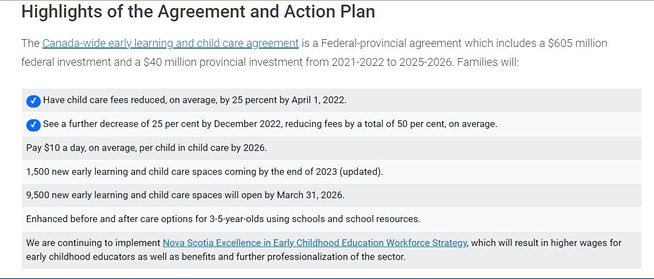
According to Gildart, hearing from families and primary caregivers from specific communities across the province ensures the future design of the child care agreement will be collaborative and community-based. “It's a very inclusive survey,” says Gildart, “meaning that it's designed not only to hear from parents and primary caregivers, but also those that are working in the childcare sector. So, ECEs, early childhood educators, operators and owners, as well as the general public because this is, as you know, a publicly funded system that we are building, and we thought it was very important that we give all Nova Scotians an opportunity to also participate in this process.”
Gildart says the survey is available in 300 languages and takes less than 10 minutes to answer. It asks things like how many children you have, what your current child care arrangement is and whether you and your partner are employed. It also invites opinions: “What do you value about publicly funded Early Learning and Child Care?” and “Nova Scotia has committed to ensuring the cost of child care will be an average of $10/day for most families by 2026. What does this decision mean to you?”
After answering, you’re given a chance to share your thoughts, briefly, about how to improve child care in the province. Thoughts from others are then shared anonymously with you to rate.
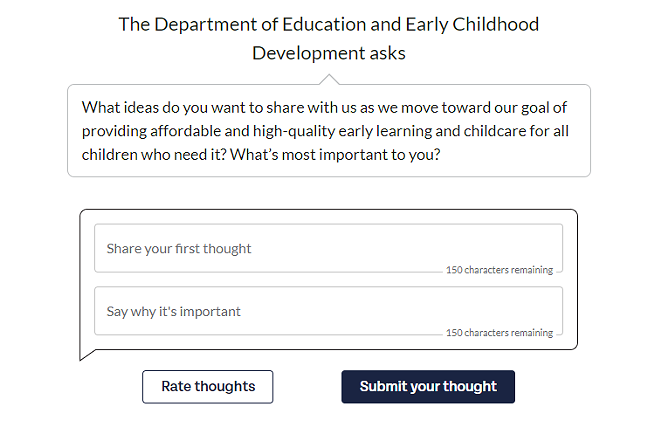
Two issues rank highest in shared overall survey results: the lack of child care spaces and the need to recruit, train and keep—through responsible and competitive wages—child care workers who offer high-quality and inclusive learning regardless of fee or location.
Alongside the survey, community consultations will run from Oct. 3-24. People can register for these online. Consultations are aimed at parents and primary caregivers whose children are enrolled in child care, will be enrolled in the future or are waiting to access care.
As the website says: “Conversations will be specific to early learning and child care involving children from infants to four years in licensed child-care centres and family homes, as well as children aged four to 12 in before and after school care. It does not include items related to the public school system.”
There are 12 community consultations in total, with a limit of 30 participants each. Eight of these are open to everyone, while four are invitation only, including a virtual session for parents and primary caregivers of children with unique needs.
Gildart says these 12 sessions are family-friendly and inclusive: parents are welcome to bring their children. One session will be in French, another will be bilingual and one will provide translators and interpreters in partnership with Immigrant Services Association of Nova Scotia (ISANS).
“We have chosen to host our in-person sessions at schools, wherever possible, because those are physically accessible spaces,” says Gildart. “For our session at ISANS, [we’ll be] choosing culturally appropriate refreshments and snacks for the session.”
For families who can’t make a session, Gildart says “accessibility is one of the key reasons why we chose to have a hybrid process where individuals that maybe don't feel comfortable leaving their home, can fully participate online through the survey.”
Gildart says the survey results will be equally weighted with feedback from in-person sessions before both are condensed into data that will help inform the second part of the process. The second phase is geared exclusively to early childhood educators—ECEs—operators and other early learning and child care partners.
Says Gildart, “We'll have more details to come as we get those plans finalized. And then after phase two is complete, we will then have a publicly available report.” Per the public engagement page, “Once both phases of the consultation are completed in 2024, we will be sharing a public report on what we learned and how this will inform decisions, plans and progress.”
The Department of Education and Early Childhood Development says the total cost of public consultations is expected to be $135,000, from session design to writing the report, and is covered through federal funding in the agreement.
“We're always interested in how the feedback that we get through public consultation can inform very tangible, actionable next steps,” Gildart says. “The report will give us very good insight into what's important to Nova Scotians as we continue to build this publicly funded system.”
Perhaps this report will help produce the overdue action plan needed to release the remaining funds.

